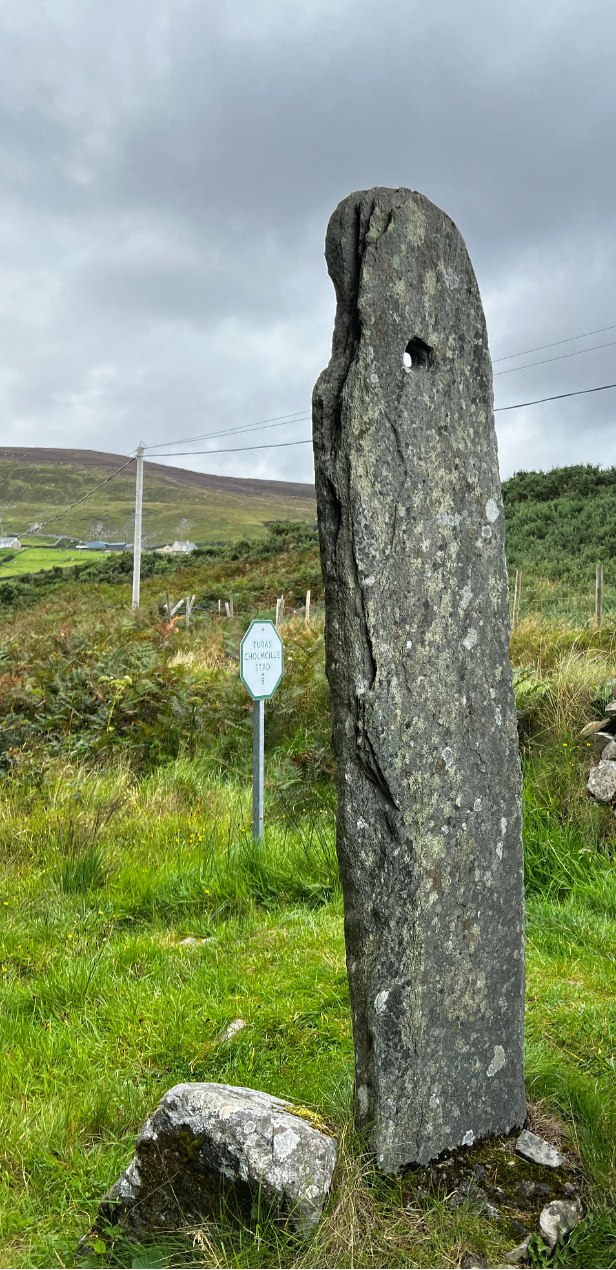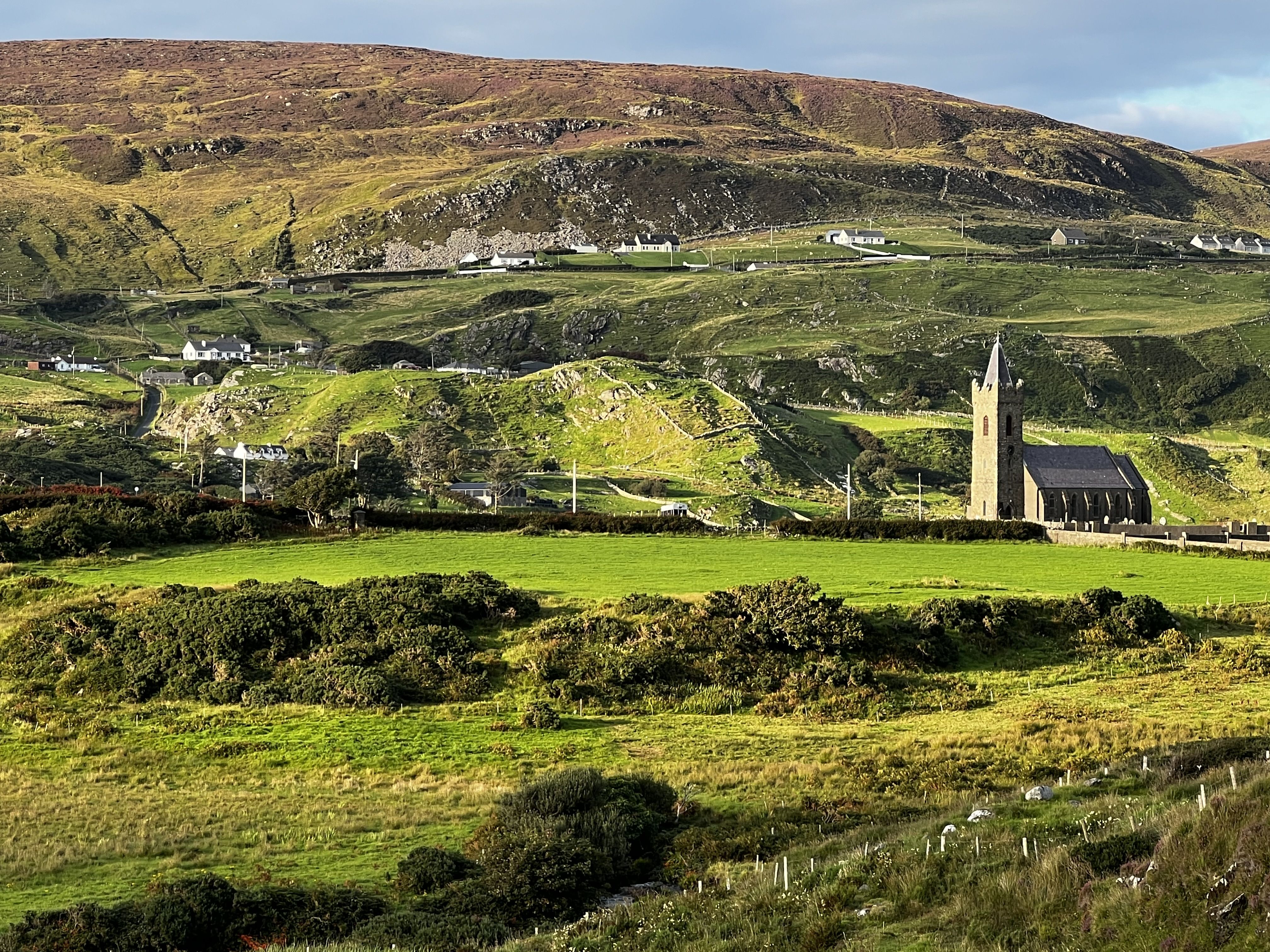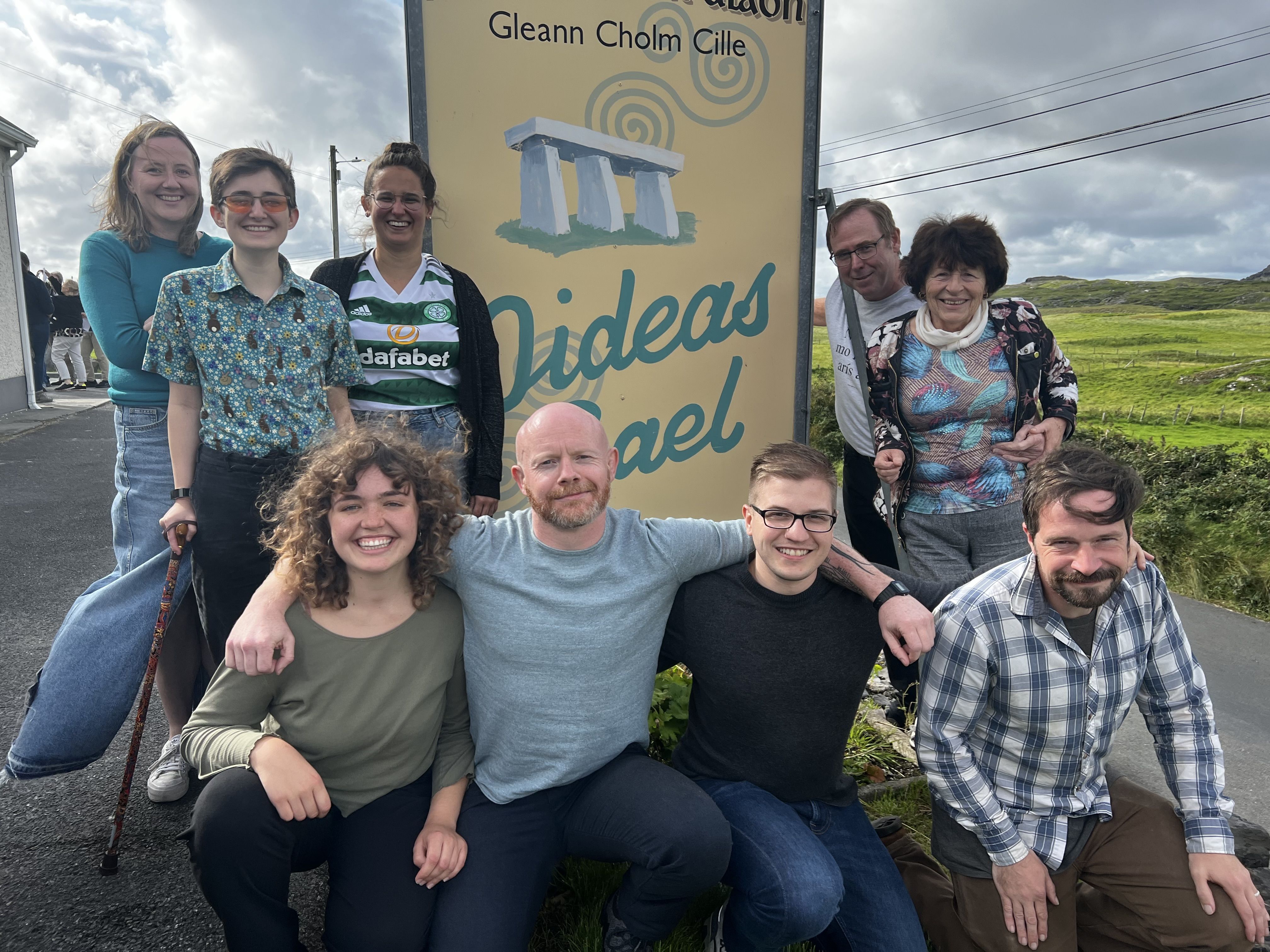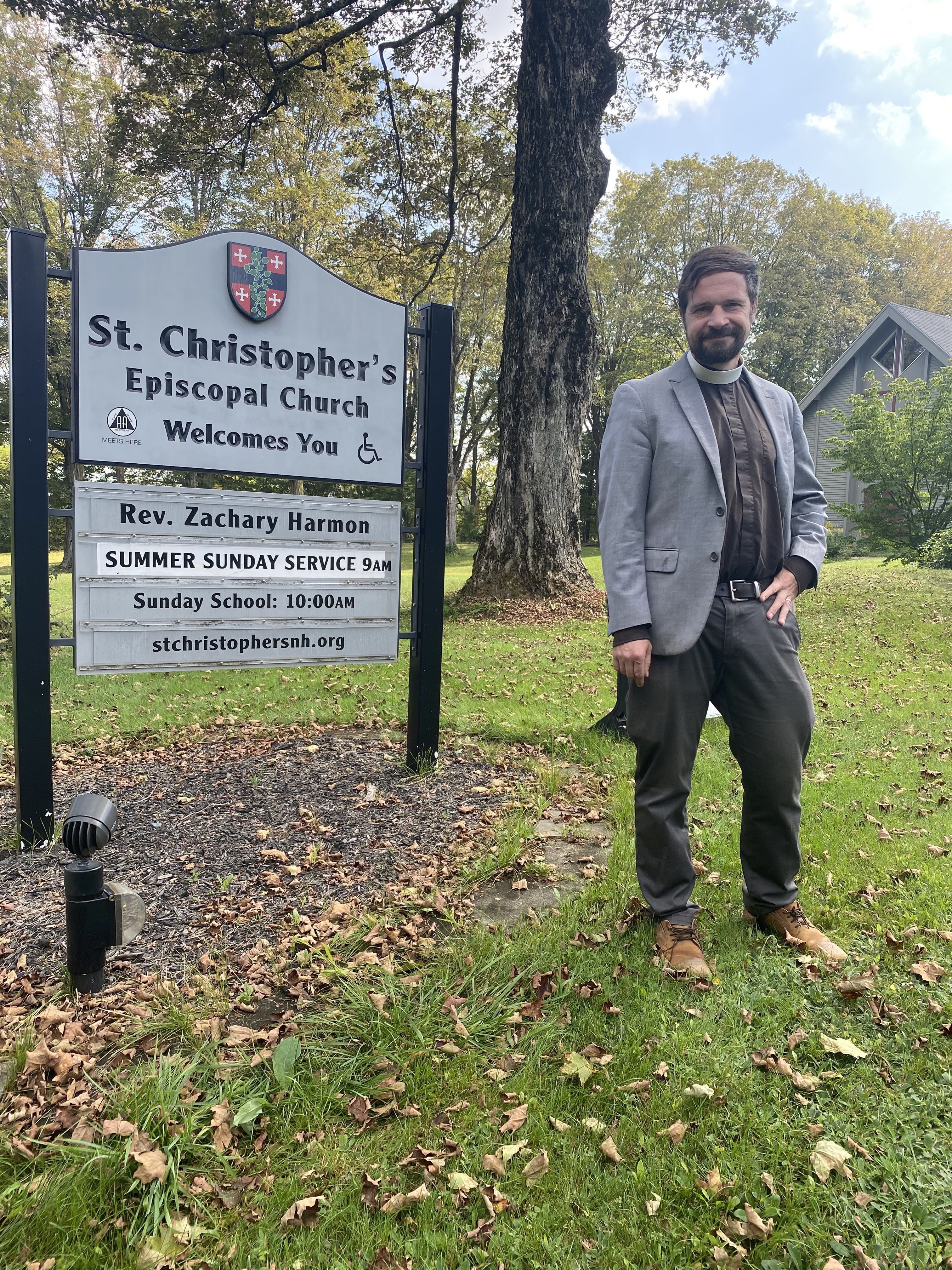There’s a Turas, or pilgrimage path, of St. Colmcille that traces its steps through nature’s stunning surroundings of Gleann Colm Cille, in southwest Donegal, where megalithic tombs, standing stones, and the odd sheep or two weave their way into the landscape and lore of the local area.

Many Americans make the summer pilgrimage to the Glen to immerse themselves in the Irish language where Oideas Gael, founded in 1984, hosts an abundance of Gaeilge classes, as well as archaeological, music and cultural offerings.
One person who made that long journey this year was Zachary (Secaría) Harmon, Episcopal pastor in St. Christopher’s Episcopal Church, Hampstead, NH.

“While I live in New Hampshire today, I grew up in the Alaskan wilderness and went to seminary in the Washington D.C. area where I also enjoyed playing hurling with the GAA's D.C. Gaels,” says Fr. Zac.
It was in that Alaskan wilderness that Zac was first given the gift of the Irish language from his Irish American parents who wanted their children to know the language of their people.
Ag caint Gaeilge an t-am go léir in #Oregon agus ár gcara Zachary Harmon anseo! Gr8 respect 4 all keeping #IrishLanguage vibrant @popupgael pic.twitter.com/nbF4yn2L82
— Let's Learn Irish! (@LetsLearnIrish) December 15, 2016
“The first time I heard the beautiful sound of the Irish language was when I was seven years old. Chances to encounter the Irish language were rare in rural Alaska in the '90s. A television program was about to begin featuring an Irish language storyteller, and my parents dropped everything to gather my sisters and me together in front of the television,” he recalls.
The wheels were set in motion that day for Zac, and he remembers the excitement that he felt to hear the language.
“My parents (who do not speak Irish) hoped that hearing the sounds of the Irish language while young children, if even briefly, would help in learning the language later.”
My sister went on an @OideasGael course & brought me back a deadly present!
— Claire Higgins (@ClarNiUigin) September 13, 2023
Spoilt! #Donegal pic.twitter.com/U93vD8iaPy
That excitement soon led to disbelief and shock as he couldn’t understand anything the storyteller was saying but Zac made a solemn vow that day that he would one day learn the language of his people.
“Wasn’t Irish Gaelic our language?” he thought. “Why couldn’t I understand it? What had happened to cause such distance between us and our language? I made a decision then and there that I would study the Irish language and its history when the chance came to me,” he recalled.
He took his first steps in Irish in Junior High by buying a book and trying to self-teach but found he needed some help. He tried again when he went to college.
“I was attending Willamette University, and they offered a wonderful study abroad program to NUI Galway for a semester complete with a week’s stay in the Connemara Gaeltacht and courses with the Centre for Irish Studies,” says Zac. "While at NUI Galway, I was able to take multiple courses on the Irish language and courses related to its history.”
He continues to study the language online through Let’s Learn Irish in D.C., where he first took in-person classes when living there. 
“I have Irish ancestry, and this is a big part of what drew me to the language. I grew up hearing stories of O’Briens in my family who suffered terribly in An Gorta Mór and who passed these stories down over the generations. On my father’s side there are also Crowleys from Cork and there are MacMahons on my mother’s side,” he says.
Zac’s love of an Ghaeilge and the Gospel has brought many opportunities for ecumenical, and Irish language occasions.
…a’ tarraingt ar an bhaile anocht domh… Loch Alltáin, cúl na hEaragaile & Na hEachlaí #DúnnanGallAbú @AimsirTG4 @BBCAimsir pic.twitter.com/6hM8s7Cr96
— Ailbhe Ó Monacháin (@AilbheOM) September 14, 2023
“I participated in a moving Irish language prayer service and Irish language hymn sing with the Church of Ireland in 2015 which included other Celtic language speakers. The event was exciting and had an inclusive and kind spirit about it,” he says.
Zac quietly brings the beauty and interpretation of the Irish language, that often resists an English translation, into his ministry in New Hampshire, allowing the language to enter the ears and hearts of those who otherwise might never be able to hear or embrace it.
“In sermon preparation I often draw inspiration and direction from ‘An Tiomna Nua’ (The New Testament) as translated by Rev. Cosslett Ó Cuinn. I picked a copy of this translation up in my student days in Galway and have often found it to be poetic with word choices that connect the world of the New Testament with the Gaelic world.
“In one sermon I drew from Matthew 13:11,” says Zac. “‘Is daoibhse a tugadh fios rún ríocht na bhFlaitheas,” or ‘The secret of the Kingdom of Heaven is given to you.’
Rún is a multi-layered word in Irish,” continues Zac. “It can mean a secret, a mystery, love or an intention among other meanings. I made use of this connection between mystery and the Love of God. I heard from parishioners that this connection of love and mystery was helpful in entering into Holy Week,” says Zac.
The New Hampshire cleric is currently on a six-month sabbatical which enabled his most recent Irish foray. His wife, Kate is also an Episcopal priest and has Irish ancestry.
A man of many parts, Fr. Zac is also completing a self-directed study on wetlands in the US which he will write up as a formal article for Episcopal and diocesan use.
An ceantar… #DúnnanGallAbú #LoveDonegal pic.twitter.com/WYFQrChPJ2
— Oideas Gael (@OideasGael) September 14, 2023
“When it comes to discussion around wetlands in the US, we have a lot of negative impressions of places like marshes and bogs," he explains. "Intellectually many people know the importance of wetlands for ecological balanc, but wetlands are also very often perceived as unsightly or frustrating obstacles to be diverted or overcome for property development.
“The neat thing about some Gaeltacht traditions I have encountered and about poets like Aoghán Ó Rathaille is that wetlands are often held in a more valued light. For Ó Rathaille, wetlands appear frequently in his works, and reveal a more imaginative, and at times even spiritual understanding of wetlands – that a marshy stream can make songs of heart-rending sorrow and that injustice and sorrow in the human realm can at times impact the natural world as well.”
With a commendable command of the language, Fr. Zac speaks An Ghaeilge with grace, fluency and style.
“Irish language learning is accelerating in the US in part due to the online courses and tools which have become widely available and due to a continuing desire among Irish Americans to regain some piece of the Irish language. I am hopeful that this increase of access and enthusiasm will lead to an increase in the Irish language community here in New Hampshire as well,” he adds.
You can find out more about Oideas Gael's acclaimed courses, in the summer, Eastertide and fall online.






